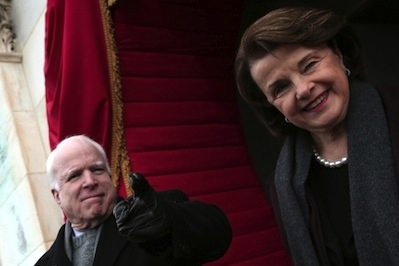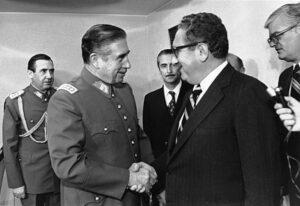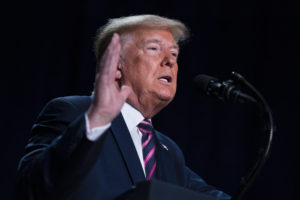Truthdiggers of the Week: Sens. John McCain and Dianne Feinstein
Whatever we think of their foreign, domestic and economic policies, the senators from Arizona and California, respectively, said the right words when the Senate Intelligence Committee released its inquiry into the CIA's post-9/11 torture, detention and interrogation practices. Sens. John McCain and Sen. Dianne Feinstein in 2013. AP/Win McNamee
Sens. John McCain and Sen. Dianne Feinstein in 2013. AP/Win McNamee
Every week the Truthdig editorial staff selects a Truthdigger of the Week, a group or person worthy of recognition for speaking truth to power, breaking the story or blowing the whistle. It is not a lifetime achievement award. Rather, we’re looking for newsmakers whose actions in a given week are worth celebrating.
On Dec. 9, the Senate Intelligence Committee released the results of a five year inquiry into allegations of the use of various forms of torture on suspected terrorists in the years immediately after the 9/11 attacks. Among other findings, the committee determined that the methods used to interrogate detainees were far more brutal than the CIA represented to legislators and the public, agency officials impeded oversight by all the relevant federal watchdog institutions, and the euphemistically titled “enhanced interrogation techniques” were not at all effective in getting detainees to cooperate or provide useful information. In fact, the agency’s own records revealed that information produced by torture was likelier to be false.
When the truth is spoken by politicians — a class of professionals endlessly devoted to sniffing out opportunities to score points over competitors and opponents — skeptics are right to suspect it’s not merely the truth. It is always tailored to redound to some benefit to the speaker. But there are moments in history when that doesn’t matter. The habitually wrong can occasionally be very right, and they deserve all the credit they can be given for being so. That moment came when Sens. Dianne Feinstein, a Democrat from California who led the investigation, and John McCain, a Republican from Arizona, introduced and interpreted the Senate’s findings Tuesday.
Feinstein went first. “Even if one were to set aside all of the moral arguments, our review was a meticulous and detailed examination of records,” she said, anticipating criticism of the report, especially from Republicans committee members who withdrew their support for the study in 2009. “It finds that coercive interrogation techniques did not produce the vital, otherwise unavailable intelligence the CIA has claimed.
“Over the past couple of weeks, I have gone through a great deal of introspection about whether to delay the release of this report to a later time,” she went on. “This clearly is a period of turmoil and instability in many parts of the world. Unfortunately, that’s going to continue for the foreseeable future, whether this report is released or not.
“There may never be the ‘right’ time to release this report,” Feinstein added. But it is “too important to shelve indefinitely.”
Feinstein’s introduction lasted an hour. McCain’s remarks lasted a quarter of that time, but as Truthdig Editor-in-Chief Robert Scheer said on the KCRW radio show “Left, Right & Center” on Friday, they “provided the definitive statement on” the report’s practical lessons and ramifications for human dignity and rights.
“I know from personal experience that the abuse of prisoners will produce more bad than good intelligence,” said McCain, who was tortured after he was taken prisoner by the North Vietnamese during the Vietnam War. “I know that victims of torture will offer intentionally misleading information if they think their captors will believe it. I know they will say whatever they think their torturers want them to say if they believe it will stop their suffering. Most of all, I know the use of torture compromises that which most distinguishes us from our enemies, our belief that all people, even captured enemies, possess basic human rights, which are protected by international conventions the U.S. not only joined, but for the most part authored.”
Anticipating a principal talking point of the defenders of torture in his party, he recognized the legitimate function of the CIA: “I respect their dedication and appreciate their dilemma. But I dispute wholeheartedly that it was right for them to use these methods, which this report makes clear were neither in the best interests of justice nor our security nor the ideals we have sacrificed so much blood and treasure to defend.”
He recognized agency officials as liars: “There was considerable misinformation disseminated then about what was and wasn’t achieved using these methods in an effort to discourage support for the legislation. There was a good amount of misinformation used in 2011 to credit the use of these methods with the death of Osama bin Laden. And there is, I fear, misinformation being used today to prevent the release of this report, disputing its findings and warning about the security consequences of their public disclosure.”
He preempted and subverted criticism that releasing the study’s findings would endanger Americans at home and abroad: “Will the report’s release cause outrage that leads to violence in some parts of the Muslim world? Yes, I suppose that’s possible, perhaps likely. Sadly, violence needs little incentive in some quarters of the world today. But that doesn’t mean we will be telling the world something it will be shocked to learn. The entire world already knows that we waterboarded prisoners. It knows we subjected prisoners to various other types of degrading treatment. It knows we used black sites, secret prisons. Those practices haven’t been a secret for a decade.
“Terrorists might use the report’s re-identification of the practices as an excuse to attack Americans,” McCain continued, “but they hardly need an excuse for that. That has been their life’s calling for a while now.”
And he warned that cruel methods make a cruel nation: “[I]n the end, torture’s failure to serve its intended purpose isn’t the main reason to oppose its use. I have often said, and will always maintain, that this question isn’t about our enemies; it’s about us. It’s about who we were, who we are and who we aspire to be. It’s about how we represent ourselves to the world.
“We have made our way in this often dangerous and cruel world, not by just strictly pursuing our geopolitical interests, but by exemplifying our political values, and influencing other nations to embrace them. When we fight to defend our security we fight also for an idea, not for a tribe or a twisted interpretation of an ancient religion or for a king, but for an idea that all men are endowed by the creator with inalienable rights. How much safer the world would be if all nations believed the same. How much more dangerous it can become when we forget it ourselves even momentarily.”
Finally, McCain acknowledged truth and conscience as corrective forces that should be permitted to come first in national affairs: “Our enemies act without conscience. We must not. This executive summary of the committee’s report makes clear that acting without conscience isn’t necessary, it isn’t even helpful, in winning this strange and long war we’re fighting. We should be grateful to have that truth affirmed.”
We “are obliged by history,” McCain said, “by our nation’s highest ideals and the many terrible sacrifices made to protect them, by our respect for human dignity to make clear we need not risk our national honor to prevail in this or any war. We need only remember in the worst of times, through the chaos and terror of war, when facing cruelty, suffering and loss, that we are always Americans, and different, stronger, and better than those who would destroy us.”
Though this final passage is vague with respect to the particular ends McCain has in mind — the kind of world he would like to see America help make — they are the right words spoken during a long period of deadly, unnecessary aggression and infuriating duplicitousness in American history. They set a precedent that makes the continuation of torture by agents of the U.S. government riskier for officials and thus less likely to occur, and the criminal prosecution of those responsible more possible. How much more? In recognition of the imperative for those who govern us to follow right words with right action, Sens. John McCain and Dianne Feinstein are our Truthdiggers of the Week.
Les Grossman NEW OFFICIAL CHANNEL:
RT:
Your support matters…Independent journalism is under threat and overshadowed by heavily funded mainstream media.
You can help level the playing field. Become a member.
Your tax-deductible contribution keeps us digging beneath the headlines to give you thought-provoking, investigative reporting and analysis that unearths what's really happening- without compromise.
Give today to support our courageous, independent journalists.






You need to be a supporter to comment.
There are currently no responses to this article.
Be the first to respond.